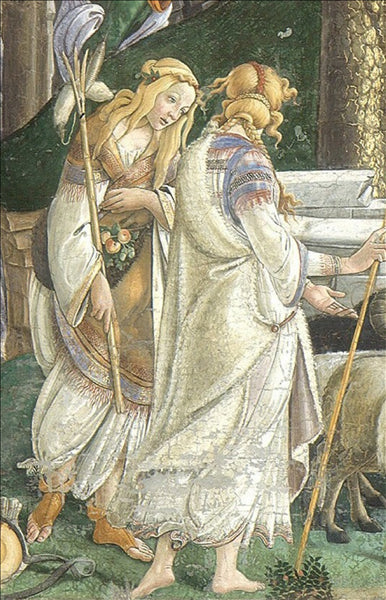Description
The painting "The Youth of Moses" (Detail) of Sandro Botticelli, created in 1482, is a work that encapsulates the mastery of the Florentine Renaissance, highlighting the artist's ability to combine biblical narratives with a palpable emotional depth. Although the detail that is presented does not cover the entire work, significant elements can be appreciated that contribute to the understanding of the theme and the stylistic approach of Botticelli.
In this fragment you can see a central figure, presumably representative of Moses in its youth. The presence of this character evokes the history of the Hebrew leader, whose life is impregnated with crucial moments that have influenced the Judeo -Christian tradition. The figure of Moses is slender and is characterized by stylized forms that are emblematic of Botticelli's work, highlighting his tendency for elegant proportions and linearity in design. The position of the young Moses, slightly inclined, suggests a subtle movement, creating a direct visual connection with the viewer, which invites the contemplation of its history.
One of the most notable aspects of this work is the use of color. Botticelli uses a soft and golden palette, which is intertwined with warm and terrible tones, evoking an almost ethereal atmosphere. The colors fuse harmoniously, contributing to highlight the figure in the center, while the background has a series of nuances that suggest a subtle but evocative landscape. This chromatic choice not only defines the pictorial space, but also establishes a contrast that emphasizes the almost divine character of Moses.
The composition of the painting, although it is fragmented, reflects the characteristic compositional structure of Botticelli, which often includes the organization of figures in serpenting lines that guide the viewer's view through the canvas. Through this line of vision, the viewer is dragged into the face of Moses, where an expression can be perceived that mixes pensivivity and determination, suggesting the emotional burden that awaits him in his path as a liberator of his people.
In terms of symbolism, the representation of Moses can be interpreted as a reflection of the search for identity and purpose, issues that resonate with human experience in general. Botticelli, known for his ability to capture Renaissance spirituality and idealism, achieves in this work to represent a conjunction between divinity and humanity, a duality that invites reflection on the role of the individual in history and faith.
Although "the Youth of Moses" covers only a fragment of a major narrative, this detail highlights the mastery of Botticelli, who throughout his career has managed to balance formal beauty with a deep symbolic burden. His style, which combines gothic influence with an incipient Renaissance naturalness, is reflected in this work, which, like other of his works, such as "The Birth of Venus" and "Spring", invites us to contemplate the interaction between The human and the divine, the temporal and the eternal.
In summary, "the Youth of Moses" (detail) is a tribute to the genius of Sandro Botticelli, a clear example of his ability to merge history, beauty and symbolism in a painting that transcends his time. The work not only illustrates a biblical scene, but also offers a window to the soul of the Renaissance, a moment in the history of art where human emotions and spirituality are intertwined in a visual dialogue that lasts to this day.
KUADROS ©, a famous paint on your wall.
Hand-made oil painting reproductions, with the quality of professional artists and the distinctive seal of KUADROS ©.
Reproduction service paintings With a guarantee of satisfaction. If you are not completely satisfied with the replica of your painting, we refund your money 100%.

